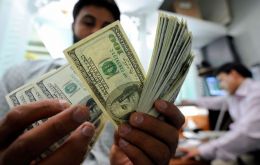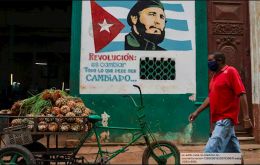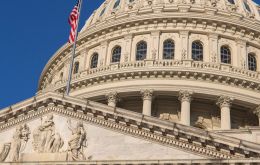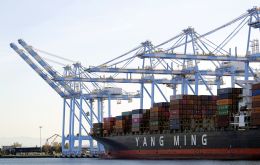MercoPress. South Atlantic News Agency
Stories for May 2020
-
Thursday, May 14th 2020 - 08:50 UTC
Fewer remittances because of Covid-19 will hit hard Central and Latin America

Remittances—the money that immigrants working abroad send home to families on a regular basis—have become a major source of funding for developing countries. In 2019, total global remittances exceeded US$550 billion, putting them on a par with levels achieved by foreign direct investment.
-
Thursday, May 14th 2020 - 08:41 UTC
US blacklists Cuba for not cooperating on counterterrorism; Havana argues “we are victims of terrorism”

The United States said on Wednesday it had added Cuba to a blacklist of countries that do not fully cooperate on counterterrorism, denouncing the presence of Colombian leftist guerrillas.
-
Thursday, May 14th 2020 - 08:20 UTC
Merkel frustrated with Russia's “outrages” spying attempts

German Chancellor Angela Merkel voiced frustration on Wednesday that Russia was targeting her in hacking action, saying she had concrete proof of the “outrageous” spying attempts.
-
Thursday, May 14th 2020 - 08:15 UTC
Chile requests IMF US$ 23,8 billion, under the Flexible Credit Line

The International Monetary Fund (IMF) Executive Board met on Wednesday in an informal session to discuss a request from the Chilean authorities for a two-year arrangement under the Flexible Credit Line (FCL) with the IMF in an amount equivalent to SDR 17.443 billion (about US$23.8 billion or 1,000 percent of quota).
-
Thursday, May 14th 2020 - 08:11 UTC
US Senate limits internet surveillance tools under the national security umbrella

The US Senate narrowly blocked an amendment on Wednesday that would have prevented law enforcement from collecting information on Americans' Internet habits without a warrant, as the Senate moved toward a reauthorization of divisive surveillance tools.
-
Thursday, May 14th 2020 - 08:08 UTC
Britain's economy shrank 2% in the first quarter and 5.8% in March

Britain's economy shrank 2% in the first three months of the year, rocked by the fallout from the COVID-19 pandemic, official data showed on Wednesday, with analysts predicting even worse to come.
-
Thursday, May 14th 2020 - 08:05 UTC
EU plans to revive the air travel industry; Europeans consumers have the right to cash refunds

Airlines will not have to leave seats empty, but passengers flying in the European Union will have to wear masks on planes and in airports under plans to revive the travel industry.
-
Thursday, May 14th 2020 - 08:00 UTC
US Senate votes financial support for local newspapers and broadcast outlets

Thousands of local US newspapers and broadcast outlets, grappling with a massive downturn in advertising because of the Covid-19 pandemic, would be eligible for financial help under legislation introduced in Congress on Wednesday.
-
Thursday, May 14th 2020 - 07:50 UTC
US accuses Chinese hackers of attempting to steal coronavirus data on vaccines

US authorities warned on Wednesday that Chinese hackers were attempting to steal coronavirus data on treatments and vaccines, adding fuel to Washington's war with Beijing over the pandemic.
-
Thursday, May 14th 2020 - 07:46 UTC
Record US port exports to China while US consumers face shortages

U.S. President Donald Trump ordered meat processing plants to stay open to protect the nation's food supply even as workers got sick and died. Yet the plants have increasingly been exporting to China while U.S. consumers face shortages, analysis of government data showed.
